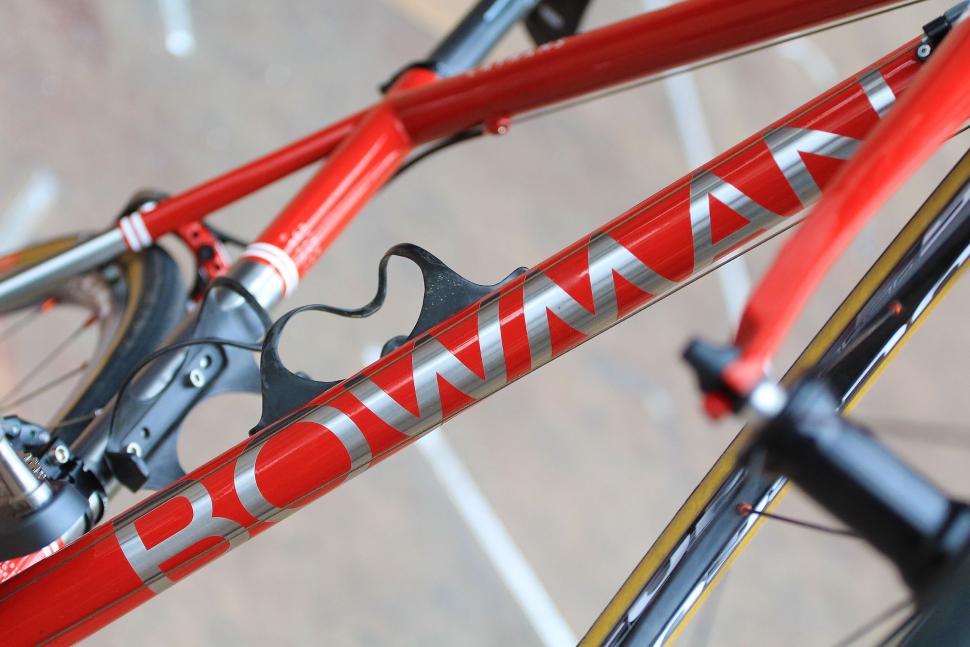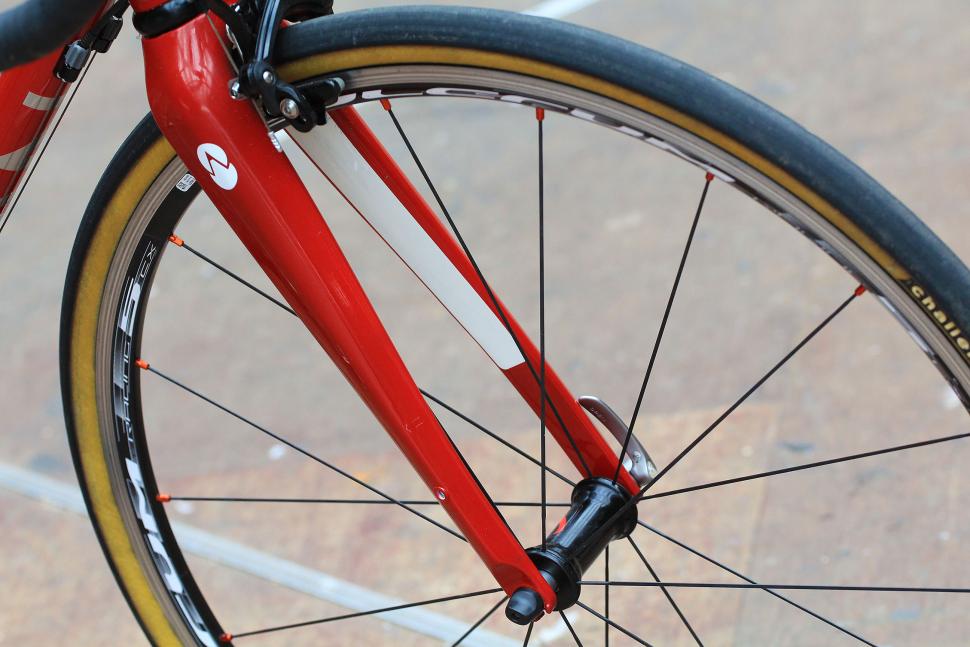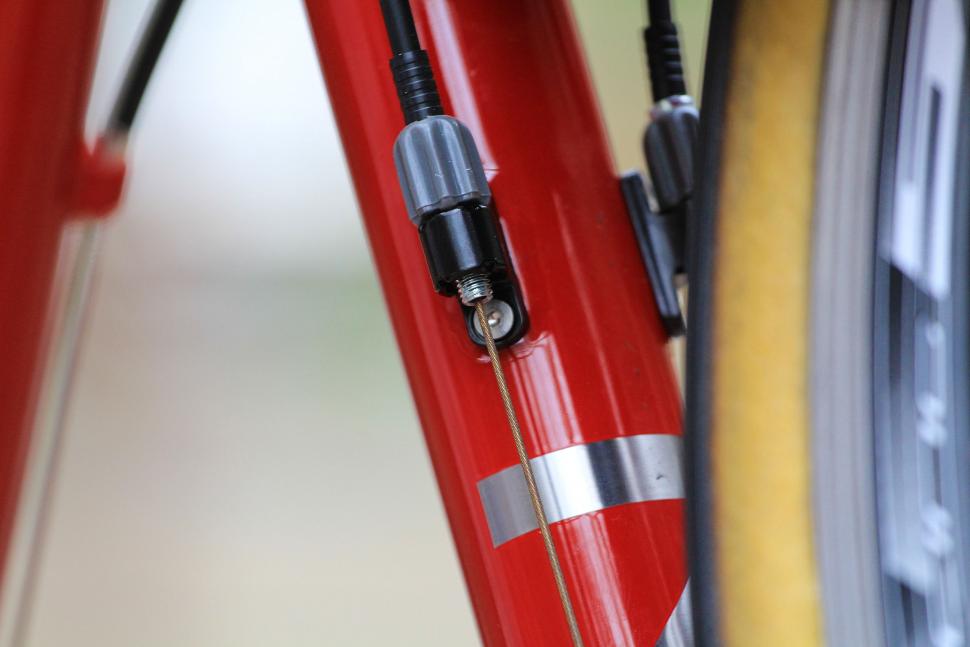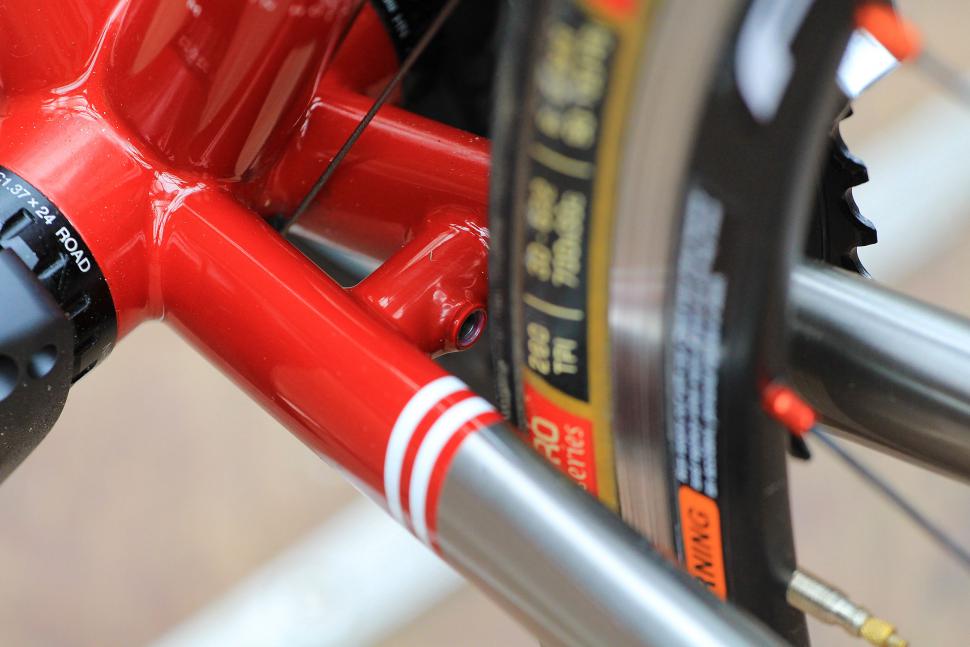- News
- Reviews
- Bikes
- Accessories
- Accessories - misc
- Computer mounts
- Bags
- Bar ends
- Bike bags & cases
- Bottle cages
- Bottles
- Cameras
- Car racks
- Child seats
- Computers
- Glasses
- GPS units
- Helmets
- Lights - front
- Lights - rear
- Lights - sets
- Locks
- Mirrors
- Mudguards
- Racks
- Pumps & CO2 inflators
- Puncture kits
- Reflectives
- Smart watches
- Stands and racks
- Trailers
- Clothing
- Components
- Bar tape & grips
- Bottom brackets
- Brake & gear cables
- Brake & STI levers
- Brake pads & spares
- Brakes
- Cassettes & freewheels
- Chains
- Chainsets & chainrings
- Derailleurs - front
- Derailleurs - rear
- Forks
- Gear levers & shifters
- Groupsets
- Handlebars & extensions
- Headsets
- Hubs
- Inner tubes
- Pedals
- Quick releases & skewers
- Saddles
- Seatposts
- Stems
- Wheels
- Tyres
- Health, fitness and nutrition
- Tools and workshop
- Miscellaneous
- Cross country mountain bikes
- Tubeless valves
- Buyers Guides
- Features
- Forum
- Recommends
- Podcast
TECH NEWS
First look: Bowman Cycles launch Layhams stainless steel road bike
Have you ever seen such a classy looking road bike? This is the latest creation from British brand Bowman Cycles, called the Layhams in honour of a road that serves as a gateway from London to the hills of Kent, and in a first for the brand, the frame is made not from aluminium, but stainless steel.
In the Layhams, Bowman has sought to create a bike that offers year-round dependability with a contemporary geometry, with space for 28mm tyres with mudguards (30mm without) yet, most interestingly, to provide “enough zip to keep the snappiest racer amused.”
Rewind to October 2014 and Neil Webb, founder of Bowman Cycles, visited the road.cc office and showed is the first fruits of his labour, the aluminium Palace race frame. Stu was impressed when he reviewed it, and a similarly positive review followed with the Pilgrims, a disc-equipped frame also made from aluminium, arrived soon after.
First look: Bowman Cycles launch with Palace aluminium frame
Layhams is the third road frame in the range and was first teased at the London Bike Show in prototype form earlier this year. The brief for the Layhams was to take the essence of the Palace - its handling and performance - and add mudguards and increased tyre clearance - key features of the Pilgrims - to make it a more versatile year-round choice, ideal for summer rides sans-mudguards or a hardy winter trainer.
Traditionally, winter bikes would be made from cheaper and heavier materials and components and designed to be reliable at the expense of ride performance. Bowman feels that shortchanges your ride enjoyment. “As your go-to bike for a huge amount of hours in the saddle, we feel that you deserve better.”
- Review: Bowman Palace frame and fork
So we have a frame made from Carpenter Custom 630, a triple butted 17-4PH stainless steel tubing, which provides the much-needed durability but also the ride comfort you want from a bike designed for long training rides.
Like the Palace, the new Layhams has the cables routed externally, a decision which Bowman favours for easier maintenance. It’s Di2 compatible as well, with a smart removable cable routing system that leaves no bosses in place, so the clean lines are maintained. We were similarly impressed with the neat cable and hose routing on the Pilgrims disc road bike.
- Bowman Cycles Pilgrims Disc frameset
Tyre clearance on the new Layhams is 30mm without mudguards, and 28mm with mudguards, using long drop brake calipers. Up front is a full carbon fibre fork and Bowman has used a 27.2mm seatpost, which should offer a bit more seated comfort.
The new Layhams frameset costs £1,400 and is available for pre-order now, and the company is offering a discount for the next two weeks if you email ferrousfiend to info [at] bowman-cycles.com.
Here's a video from Bowman founder Neil Webb in which he talks about the new Layhams frame, as well as some riding around the lanes of Kent. And cake consumption.
David worked on the road.cc tech team from 2012-2020. Previously he was editor of Bikemagic.com and before that staff writer at RCUK. He's a seasoned cyclist of all disciplines, from road to mountain biking, touring to cyclo-cross, he only wishes he had time to ride them all. He's mildly competitive, though he'll never admit it, and is a frequent road racer but is too lazy to do really well. He currently resides in the Cotswolds, and you can now find him over on his own YouTube channel David Arthur - Just Ride Bikes.
Latest Comments
- RoubaixCube 2 sec ago
I dont know what Conti were thinking with that price. But I can often find GP5000's for the same price or as low as £43 for the TR versions
- brooksby 4 hours 48 min ago
My wife's "pootle around the village " bike is an old Raleigh with rod brakes. They are NOT fun to play with.
- brooksby 4 hours 50 min ago
Or even better: make driving licences weight-restricted. AIUI you have to take a different test to be able to drive a minibus or a LGV or a HGV....
- NPlus1Bikelights 5 hours 29 min ago
I think buying anything off Covert Instruments would equate to going equipped over here.
- David9694 6 hours 4 min ago
Cromwell Road parking 'nightmare' next to Dorchester South...
- Doctor Fegg 7 hours 48 min ago
Ah, British Cycling and the UCI. It's hard to think of two more universally beloved organisations. Thames Water and the National Rifle Association...
- David9694 8 hours 24 min ago
Car hits stone wall and overturns in smash outside Wiltshire pub...
- wtjs 9 hours 20 min ago
We get these 'high action rate' claims all the time, with little or no evidence of what the action was. People are, of course, entitled to consider...
- Bungle_52 9 hours 34 min ago
Thank you. Can't say I've ever seen one but I will keep a lookout in future.
- chrisonabike 9 hours 35 min ago
Part of me hopes they don't waste the money. If past performance is any guide poor resurfacing (particularly around utility access points), "works...




























Add new comment
18 comments
@Macrophotofly
" On your website the red frame looks a nice bright red, but here it looks a more orangey red. Which is it please?
Also is there any possibility of getting a special paint colour or more colours being available in the future? I think a nice deep blue, with the stainless showing as above, would have me emptying my pockets to buy this right now....."
Crikey, describing colours on the interent, thats more tricky than explaining tubing design...
In the 'flesh' the bike is a brighter red than it appears on these images i think (it was a flat light day, under a covered market outside the road.cc office when the shots above were taken. Looking at the bike next to the screen with both pages open, i'd say the shots on the bowman site are far closer to the reality.
If you want to drop an email to info at bowman dash cycles dot com, i can send a photo of it next to a post box, with a can of coke (the most consistant reference red i can think of that would be easy to get my hands on)
We will of course be offering the same paint design with a gloss black as standard, and in the future, may well do limited colour runs, but for now, it is black or red.
Thanks
Neil.
@Disfuncyional_T.
"> It wasnt designed with weight as a priority, so i didn't
> actually weigh it before building it up.
That doesn't inspire confidence. Wouldn't a good CAD program/designer be able to estimate the weight of the frame accurately? Don't you have specs from the company that built it?"
I have specs, and 'claimed' weights, but would rather trust the scales with a frame in my hands
Accurate estimations, they can be created, but - its a high quality stainless steel frame, with triple butted tubing - in similar specs to other triple butted frames. As a result, we knew it would be competetive on the weight side of things, and that is all i required - the exact numbers are pretty irrelevant compared to actual ride feel - for me at least. I would always prefer to be smiling coming out of the corner, that save a potential 50 grams.
When designing, we had a target weight of sub 1600grams for a 54. It calculates as meeting the target.
I have full specs from the company of each individual tube at full length, the copmutational calculaions tpo get very accurate estimates based on mires and cut tubes across a full size range are actually quite large, and not the best use of the frame manufacturers time. Small parts (cable fixtures and eyelets) plus the weld material would also play with the accuracy.
"It is pretty, but what does it offer that a Gosforth 931 doesn't offer for 1/2 the price?"
Thanks for the pretty. Re the Gosforth: Its a great value frame for sure, what does the Layhams have that it does't? Tapered headtube, more manipulated tubing profile, Di2 compatibility, Paint, (subjective) aesthetics, BrushBrite graphics, Tyre clearance for larger rubber, Stainless steel bearing headset, cnc machined seat clamp - and a full carbon, mudgaurd compatible, 30c tyre clearance fork, painted to match.
"You can also get a super nice custom titanium frame for that price"
You always have a choice, and that is a good thing.
"And the titanium is going to be more durable because it is more dent resistant because of its thicker walls"
That does depend on the final spec of the tubing used on the bike built, and the ride feel you are going for - Its unfair to compare any bike with another theoretical bike.
"Thin wall steel tubing is more prone to denting than the same weight titanium."
Titanium has a lower youngs Modulus that steel, particularly Nickel steel alloys (our stainless is a predominantly Nickel alloy - Cromium steels are amongst the highest YM). That means for the same chassis stiffness, thicker walls or larger diameter tubes need to be used - which would result in added weight or added cost or very thin walls. As mentioned earlier, its all compromise, and i chose the stainless route as i dont personally feel its possible to get the ride feel you can with stainless, and still get to the weight or price we wanted to reach with the Layhams, but as ever, its all about choice - both mine at the design stage and ultimatly the customers.
Hopefully that goes some of the way towards explaining some of the process we go through when planning and developing our products and I know that to make something some people will love, you have to make something that other people wont like - and i am happy with that.
Thanks for the feedback though,
Neil.
Hi Neil, On your website the red frame looks a nice bright red, but here it looks a more orangey red. Which is it please?
Also is there any possibility of getting a special paint colour or more colours being available in the future? I think a nice deep blue, with the stainless showing as above, would have me emptying my pockets to buy this right now.....
Hi Again, drop us an email - we may have something of interest for you sir - Neil.
Where's the tissues...
actually, i cant - or not accurately.
It wasnt designed with weight as a priority, so i didn't actually weigh it before building it up.
(that and being rather excited to ride it)
But, it has come in a complete bike at about 500-550 grams heavier than a similarly specced Palace.
The forks have around 90-100 grams, so the frame is around 1650-1700 as an estimate.
Cheers.
Before you go please could you tell us the weight of the frameset, I registered my interest on the website a while ago.
Does this mean i can crack on with some other stuff now?
cheers all for the interest though, its always good to help spread the ed yum a cation.
Neil.
Indeed, hence I'm still alive...
My brain hurts!
Were you wearing a helmet...?
@fukawitribe,
crikey, can of worms potential...
I'm now going to try to offer an understandable, reasonably simplified answer (so the engineers - lee-way please)
Ultimately, the 'feel' of a frame comes down to the Youngs Modulus of a material, and the shape of the structural parts.
Varying the alloying elements of the material affects the youngs modulous, as well as tensile strength.
For a given material, you can resist a given load by varying either wall thickness or diameter (smaller tube / thicker wall - larger tube / thinner wall) - the exact ratio's depend on the material - see YM and TS.
so, regarding a frames design and 'comfort'
Ultimately, it is down to tubing diameter above all else, but the shape, wall thickness and material all have a substantial effect on the final product.
Smaller tube diameters need thicker walls to resist a bending load (read as make a frame stiff for simplicity), so larger diameter tubes are used where you want to keep the frame more rigid (keeping seat and head tubes in line for cornering as an example), an oval tube will resist bending more in one direction than another (Horizontally oriented, oval top tube to resist side loads in steering, but offer some longitudinal flex in a vertical plane)
Go too thin to reduce weight in an oversized tube, and you get into wall damage in accidents territory
The Old school columbus Max OR tubing was renowned for being horrendously stiff - an experiment to show how stiff you could make a steel frame - the reason it was short lived is that people didnt really like it - even road racers (and you'll only really see old stock now used on huge frame sized steel race bikes) It was also a Nivacrom alloy, vs a chromoly alloy on Chrom OR - so that would also affect the feel of the two frames - but the point is valid in a large part
On a similar vein, Genesis even had to tone back the original Volare team bikes - they worked with Reynolds to make the 953 tubing as race ready as possible as the team had worried about the frames being stiff enough, and they ended up with riders asking for 'softer' frames - that was purely down to tube shape and wall thickness manipulation.
As with all design processes, its a compromise between many competing elements, and ultimately, the final design is what the designer (me in this case) feels is the 'compromise' they deem matches their wish list.
so, in answer to the original query of Dave's Quote
Quote:
So we have a frame made from Carpenter Custom 630, a triple butted 17-4PH stainless steel tubing, which provides the much-needed durability but also the ride comfort you want from a bike designed for long training rides.
Wityh expansion, what he said is correct, a triple butted 17-4PH stainless steel tubing, which provides the much-needed durability - in the chosen combination of triple butted stainless steel, in the diameters chosen and in the formation chosen - offers "the ride comfort you want from a bike designed for long training rides."
Hope that makes some sense, and gives some insight.
Neil
I know, sorry about that
I does indeed make sense, - and the summary is along the lines of what was originally floating in my head so that's reassuring i've not entirely lost the plot. Many, many thanks for taking the time to reply.. much appreciated and good luck with the bike - looks stunning.
Cheers
Tim
Good point. When I was at Uni in the very early 90's, a mate and I had Dave Yates frames made (a great way to spend the whole of the very first student loan we reckoned ), me from normal size Chrom Or steel tubing and my mate from very over-sized thin-walled steel Max Or tubing.
), me from normal size Chrom Or steel tubing and my mate from very over-sized thin-walled steel Max Or tubing.
Mine was (and still is) a lovely bike to ride. His was horrendous; massively, massively stiff and unforgiving.
Wouldn't that come more from the tube shape, size and arrangement ? In very simplistic terms, I was under the impression that the 'comfort' and 'give' in old steel framed bike was partly (mostly?) due to the smaller tube sizes, often dictated by weight considerations - a steel framed bike with tubes like the massively over-sized aluminium monstrosities of days gone by being pretty much as overtly rigid... Neil, any enlightenment ? Be cracking to hear from someone really in the know rather than random stuff from the 'tubes.
Hi Vejnemojnen, that angle is a little awkward - i've just stuck a pic up on our instagram that shows the clearance a little better - search the gram for Bowman_cycles, as the folks here at Road.cc dont automatically allow lins in the comments (they need moderating, for obvious reasons - so this would probably be quicker)
Thanks, Neil.
those tyre sidewalls seem to be in a very intimate relation with the chainstays
It's just what steel does; perhaps stainless is shameless.